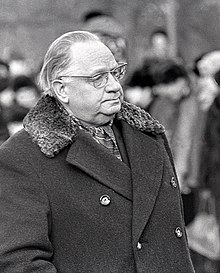Johannes Käbin

You can help expand this article with text translated from the corresponding article in Estonian. (December 2013) Click [show] for important translation instructions.
|
Johannes Käbin | |
|---|---|
 Käbin in 1978 | |
| First Secretary of the Communist Party of Estonia | |
| In office 26 March 1950 – 26 July 1978 | |
| Preceded by | Nikolai Karotamm |
| Succeeded by | Karl Vaino |
| Personal details | |
| Born | 24 September 1905 Kalvi, Virumaa, Estonia |
| Died | 25 October 1999 (aged 94) Tallinn, Harju, Estonia |
Johannes Käbin (Russian: Йоха́ннес Кэ́бин), also known by his Russified name Ivan Gustavovich Kebin[1] (Russian: Иван Густавович Кэбин; 24 September 1905 – 25 October 1999), was an Estonian Soviet politician who led the Communist Party of Estonia from 1950 to 1978.[2] Käbin was an ethnic Estonian but had been raised in Russia (so-called "Yestonian"),[3] as his family had moved to Saint Petersburg in 1910. After Estonia regained its independence until his death, Käbin was a member of the Social Democratic Labour Party.
Biography
[edit]Johannes Käbin was born in 1905 in Kalvi, Virumaa. In 1907, Käbin's family moved from Estonia to St. Petersburg, where his father died in the same year. In 1916, together with his mother and older sister, he moved to the village of Sussanino in Petrograd Province, where the family bought a small farm (0.27 hectares). In 1926 he entered the Leningrad School of Soviet and Party Construction. A year later, Käbin was appointed chairman of the Susanin Village Council of the Gatchina (Trotsky) district. He completed his studies from Institute of Red Professors in 1938.
Career
[edit]Johannes Käbin was a significant figure in Estonian politics, serving as the First Secretary of the Communist Party of Estonia for 28 years, starting from 1950. Käbin skillfully navigated the complex political landscape and his leadership was marked by a balance between compliance and resistance to Soviet policies. He was in this position for more than 25 years, in part due to the Kremlin’s approval of his policies. He was the Chairman of the Supreme Soviet (head of state) from 1978 to 1983.
Käbin used his diplomatic skills to negotiate with Soviet authorities, ensuring that Estonian agricultural practices, language and culture were respected and preserved. He is frequently recognized for his unwavering commitment to the well-being and prosperity of the people.
His leadership style was seen as more moderate and understanding compared to other Soviet leaders, which fostered a sense of trust and support among the people. These efforts collectively contributed to a more positive and stable environment, which in turn helped improve the overall happiness and well-being of the Estonian people during his leadership.
Later life
[edit]After the restoration of independence, he remained in Estonia. He died in Tallinn in 1999 at the age of 94. He is buried in Metsakalmistu.
Personal life
[edit]His son is the physicist Eduard Käbin (born 17 April 1945), who is a graduate of Moscow State University and is a Honorary Worker of Higher Professional Education of Russia.[4]
Awards
[edit]He received many awards, such as the:
- Hero of Socialist Labour (1975)
- Six Orders of Lenin (1950, 1955, 1958, 1965, 1971, 1975)
- Order of the October Revolution (1973)
- Two Orders of the Red Banner of Labour (1946, 1981)
- Order of Friendship of Peoples (1985)
- Medal "For Labour Valour" (1959)
References
[edit]- ^ "КЭБИН ИВАН ГУСТАВОВИЧ - Визуальный словарь". vslovar.ru. Retrieved 2021-07-10.
- ^ OKIA. "Nõnda arvas Käbin …". Sirp (in Estonian). Retrieved 2021-07-10.
- ^ Eesti Päevaleht = Estniska Dagbladet, August 4, 1979, p. 2 "SUUND", signed by KLA
- ^ "Кэбин Эдуард Иоханнесович". nuclphys.sinp.msu.ru. Retrieved 2021-07-10.